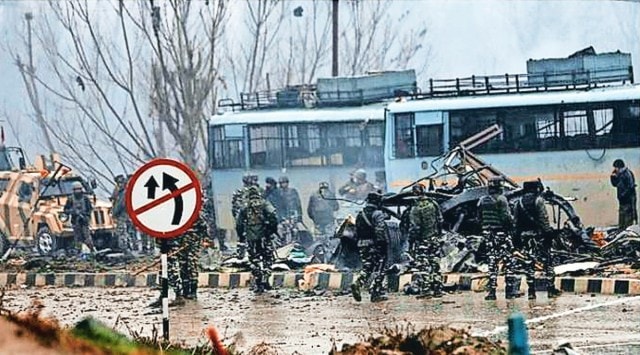Pulwama attack: CRPF probe had flagged intel failure, convoy length
According to sources, the convoy had become long since there had been no movement on Srinagar-Jammu highway for several days before that due to snowfall.
 After the attack in in Pulwama on February 14, 2019. Express File
After the attack in in Pulwama on February 14, 2019. Express File Former Jammu and Kashmir Governor Satyapal Malik has said in an interview to The Wire that prior to the Pulwama attack, the Home Ministry had refused to provide five aircraft requisitioned by CRPF to ferry its personnel, which resulted in a large number of security personnel moving by road in a convoy and becoming the target of a deadly terrorist ambush.
The Sunday Express reached out to CRPF D-G, S L Thaosen, for a comment. He did not respond to calls and messages. An email sent to the D-G and the ADG (Operations) did not elicit any response.
Following the deadly car bomb attack on a CRPF convoy in J&K on February 14, 2019 that left 40 personnel dead, the force had conducted an internal inquiry into lapses that led to the attack.
The inquiry had largely flagged intelligence failure and excessive length of the convoy as the major reasons for the attack.
According to sources, the CRPF inquiry had found that while there had been many inputs about IED attacks, nothing specific was shared about the convoy. It also flagged the convoy’s length as one of the weaknesses in the security preparedness for the movement of forces.
The government sanctioned air travel for all soldiers posted in J&K following the attack.
Sources said the inquiry had pointed out that on the day concerned, the convoy had 78 vehicles, which was unusually long. The inquiry, sources said, pointed out that this not only made information about movement of the convoy prone to leak but also made it very visible and accessible.
Around 3.30 pm, while the convoy was passing through Pulwama, a car came on the highway from a side road and drove close to the fifth bus in the convoy before exploding. The inquiry had also lauded the role of a CRPF trooper who had spotted the car while going on the highway and tried to stop it. He, too, was blown up in the blast.
According to sources, the convoy had become long since there had been no movement on Srinagar-Jammu highway for several days before that due to snowfall. This had led to forces personnel who were scheduled to leave the Valley for duty elsewhere being held up in Srinagar.
The investigation was handed over to the NIA by the Home Ministry. The NIA filed a 13,800-page chargesheet in the case, blaming Jaish-e-Mohammed and Pakistan for the attack.
Claiming that the attack used close to 200 kg explosives, including around 35 kg RDX, the chargesheet arraigned 19 people as accused. These include JeM chief Masood Azhar, his brothers Rouf Asgar and Ammar Alvi and his nephew Mohammed Umer Farooq, key planner of the attack who infiltrated India in April 2018 and was killed in an encounter in March 2019 after the Pulwama attack.
Farooq is son of IC 814 hijacker Mohammed Ibrahim Ather. The 1999 hijacking of the Air India flight had led to the release of Masood Azhar from Indian custody.
The NIA mentioned evidence of a batch of five JeM operatives, including Umer Farooq, having crossed over to India in April 2018 using a tunnel on the international border in Samba sector of Jammu.
Around the time of the attack, hundreds of WhatsApp calls were exchanged between numbers in Pakistan and the numbers held by Farooq and his associates. The NIA had been able to give pinpoint locations of these numbers in Pakistan.
Besides this, NIA has also attached an identity card with “Pakistan National Identity Card” written on it. It carried the picture of Farooq and had his details. Such identity cards are issued by Pakistan’s National Database and Registration Authority and are mandatory for voting and to get a passport made, sources said.







